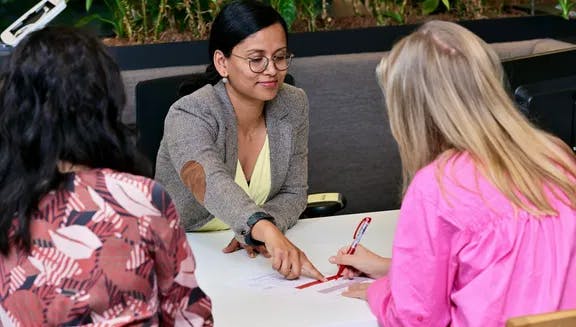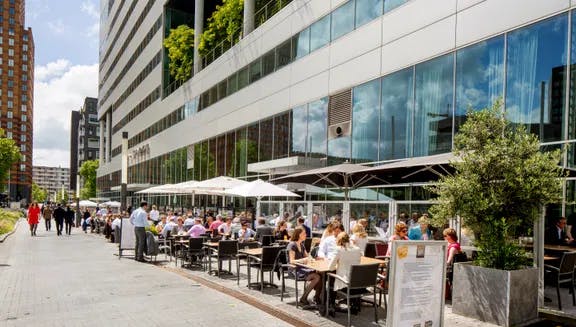
Move to the Amsterdam Area in 9 steps
Relocating to the Amsterdam Area
Moving to a new city is always an exciting step, and if that city is in a new country, it makes it even more adventurous. That said, the experience can feel overwhelming at times. Luckily, there are many great aspects to living in Amsterdam. It’s easy for newcomers and expats to settle in, given the city’s cosmopolitan spirit, rich cultural life and large international community – combined with the city’s compact size to make getting around a breeze. But of course, there are a few boxes to tick ahead of your relocation.
1. Find out which documents are required
It is always easier and quicker to arrange the paperwork before you move away from home. Relocating to the Netherlands requires different steps according to your personal situation. Some people will require a visa to enter the Netherlands, and when applying for a residence permit, you will require various original documents. Finally, when you eventually register with your local municipality, you’ll likely need to have official proof of identity, such as birth certificates, marriage certificates and other legal documents.
Please note: in some cases, legally translated documents may be requested, but even for materials already in English, all original documents must be officially authenticated. Find out more about legalisation of foreign documents for use in the Netherlands.
- Find out about entrance visas
- Learn more about residence and work permits
- Find out if you qualify as a highly skilled migrant
- Find out how you can have your document legalised for use in the Netherlands
- Learn what Brexit means for UK citizens looking to move to the Netherlands
- Use the available relocation app tailored for international talent
2. Find work
Perhaps you’re moving to Amsterdam for a new job, but if not – or if you’re moving with a family member who is moving for work – familiarise yourself with the employment market in the city before your move. There is a wide variety of options available for international talent. Research expat jobs in the Netherlands and get familiar with the local job boards. If you’re moving to Amsterdam with the intention of starting a company, be sure that you have the necessary residence and work permits.
3. Arrange housing
Finding the right home before moving to a new country can be especially tricky. Before you move to the Amsterdam Area, begin with a little research. Check out the options for house and apartment rentals advertised online. When arranging a short-stay property for the first month or two, it’s certainly handy to find somewhere near your desired neighbourhood or place of work, but Amsterdam is small enough that this isn’t essential.
4. Prepare your pet for relocation
Bringing your pet to Amsterdam is not usually a problem, but it is a process that can take between six and 12 months of preparation, so it’s essential you begin as early as possible. Your pet has to meet all of the present vaccination standards required in the Netherlands and also have a valid pet passport. Dogs, cats and ferrets must also have an identity chip fitted. Other conditions apply to more unusual species and for pets travelling from outside the EU. If travelling long distances, it’s well worth contacting a pet relocation specialist to arrange transport, ensuring a safe and comfortable journey.
5. Import your car
If you’re importing a vehicle to the Netherlands, you’ll need to be aware of the taxes and fees that apply. These vary depending on where the car is registered. Cars imported from the EU require less administration to bring to the Netherlands than those imported from outside, but authorisation from the local customs office is a prerequisite. You’ll also need to arrange a vehicle registration certificate, pay motor vehicle tax and take out adequate insurance.
6. Get started with learning Dutch
Amsterdammers are famously open to communicating in English, but those who make the effort of learning the local language definitely find that being able to speak and understand a little Dutch helps you to settle in quicker. Look around for local languages classes, download mobile apps to practice learning words and grammar, or purchase a language-learning package.
7. Find a local school
If you are moving with children, there is a huge variety of education options in the Amsterdam Area, both in terms of traditional Dutch schooling and international schools. It is easy to begin researching schools before moving – most international schools have comprehensive websites and also welcome it if parents of potential pupils get in touch.
8. What to do when you arrive in the Amsterdam Area
Once these basics are out of the way, you’re ready to look into first steps for after you arrive in Amsterdam.
- Register in the Amsterdam Area to receive your citizen service number
- Arrange health insurance
- Open a bank account
- Register with a doctor
- Find a dentist
- Follow our tips for feeling at home in the Amsterdam Area
- Get free support at the ACCESS Netherlands help desk
- Receive free support for tenants regarding housing issues at !WOON
9. What to do when you leave the Netherlands
If you are an EU, EEA or Swiss citizen or have a valid residence permit for the Netherlands, there are a few important formalities you should take care of before leaving the Netherlands.
- Discover what you need to arrange before you leave and ensure a smooth transition.









